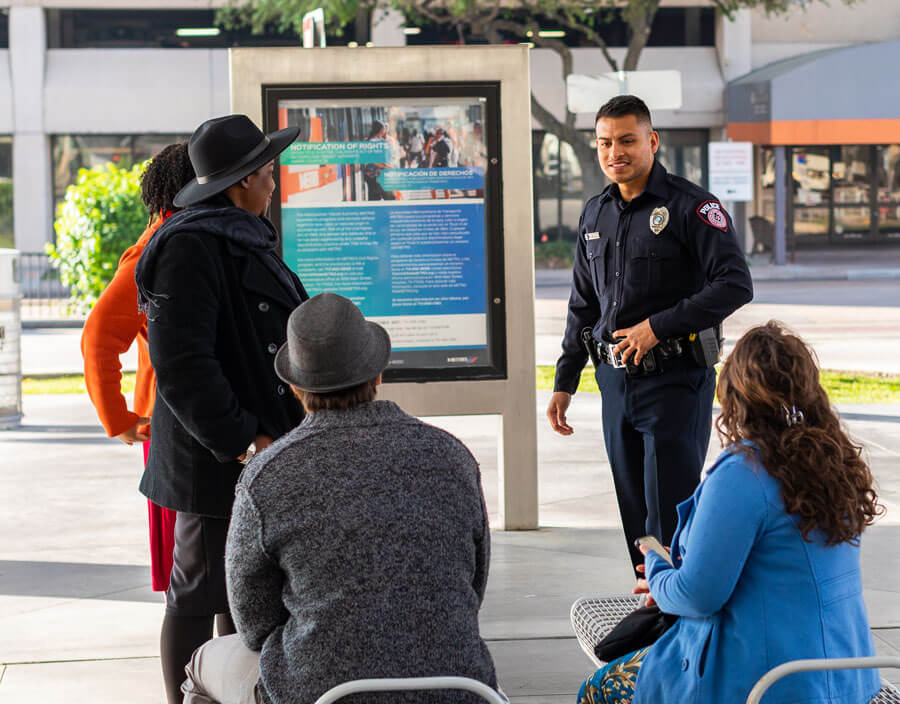Section 1.06 - Immediate Suspension
METRO Police Officers have the authority to immediately remove a person from METRO property who violates the Prohibited Conduct set forth in Section 1.05 above. The METRO Police Officer will issue
to such person an order to immediately exit the property for the remainder of the service day.
Section 1.07 - Transit Suspension Procedure
Committing an infraction of the Prohibited Conduct set forth in Section 1.04 above may be cause for suspension of a person’s privileges to enter METRO’s property and use
the transit system. Notice of such suspension shall be in a written Suspension Notice and shall inform the person suspended of the cause, the period of the suspension, and that failure to comply may be grounds for criminal prosecution. A Suspension
Notice may only be issued by a METRO Police Officer.
Section 1.08 - Length of Suspensions
A person receiving a Suspension Notice that does not involve violence, injury, or property damage shall be suspended for a period of up to 14 days.
A person who violates an active Suspension Notice will be suspended for an additional period of up to 30 days.
A person receiving a Suspension Notice for vandalism or property damage, trespass (not including the violation of a current suspension notice), or fare violation shall be suspended for a period of up to 60 days.
A person receiving a Suspension Notice for criminal acts against a person or involving a firearm or other dangerous weapon shall be suspended for up to one (1) year and may, given the severity of the offense, be permanently banned from the transit system.
Section 1.09 - Appeal of Suspensions
Persons who have been issued a Suspension Notice may appeal their suspension to the Appeals Coordinator within five (5) business days of issuance.
A request for appeal must include the citation number, grounds for appeal, date of request and contact information of the requestor. Appeals may be submitted through the Appeals Coordinator either by email to SuspensionAppeals@ridemetro.org, written letter to the METRO Appeal Program, P.O. Box 61429, Houston, TX 77208-1429 or by telephone, 713-739-4941. Further details concerning the appeals process will be provided on the Suspension Notice.
If the person issued the Suspension Notice is unable to submit an appeal, the request may be submitted by their representative, upon written verification regarding the authority to act on behalf of such individual.
The Appeals Coordinator will review all relevant information and provide notification via e- mail or written letter within five (5) business days of their decision. The Appeals Coordinator has the authority to reconsider and modify the suspension period. The written notification will provide details for person to make a final appeal to the Suspension Appeal Panel.
Section 1.10 - Suspension Panel
Within five business (5) days from receipt of the Appeals Coordinator’s decision, the person may seek final resolution from the Suspension Appeal Panel. The Panel shall act on behalf of and at the direction of the President & CEO. The Suspension
Appeal Panel shall be comprised of five (5) voting members: Manager - Customer Service, Manager - Operations, Manager – Safety, or their designees, and two (2) community representatives. Three (3) members of the Panel shall constitute a
quorum. Appeals will be decided by a majority.
Section 1.11 - Fare Forfeiture
An individual who is suspended from the transit system will not be entitled to any refund of unused fare media that may expire during the time of his/her exclusion.


 Google Chrome
Google Chrome
 Safari Mac OS
Safari Mac OS
 Mozilla
Mozilla
 Microsoft Edge
Microsoft Edge